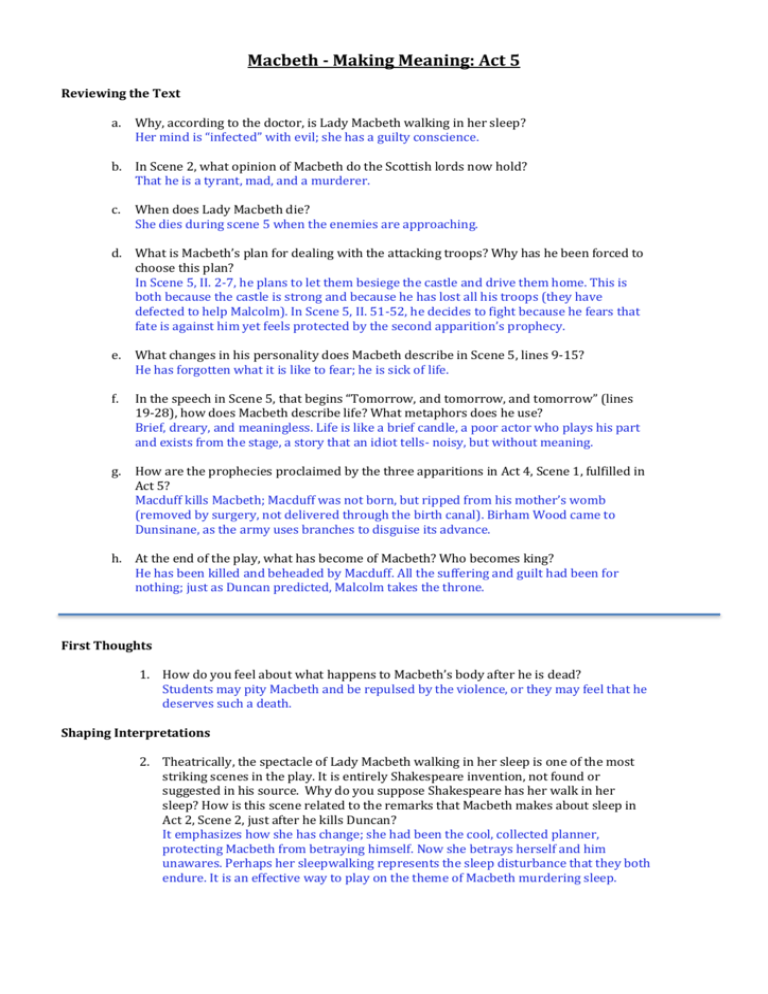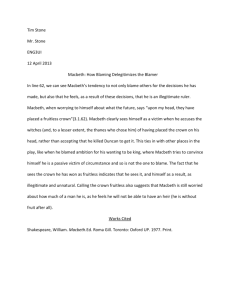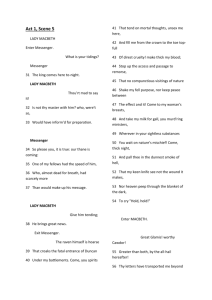Making Meaning Act 5 Answers
advertisement

Macbeth - Making Meaning: Act 5 Reviewing the Text a. Why, according to the doctor, is Lady Macbeth walking in her sleep? Her mind is “infected” with evil; she has a guilty conscience. b. In Scene 2, what opinion of Macbeth do the Scottish lords now hold? That he is a tyrant, mad, and a murderer. c. When does Lady Macbeth die? She dies during scene 5 when the enemies are approaching. d. What is Macbeth’s plan for dealing with the attacking troops? Why has he been forced to choose this plan? In Scene 5, II. 2-7, he plans to let them besiege the castle and drive them home. This is both because the castle is strong and because he has lost all his troops (they have defected to help Malcolm). In Scene 5, II. 51-52, he decides to fight because he fears that fate is against him yet feels protected by the second apparition’s prophecy. e. What changes in his personality does Macbeth describe in Scene 5, lines 9-15? He has forgotten what it is like to fear; he is sick of life. f. In the speech in Scene 5, that begins “Tomorrow, and tomorrow, and tomorrow” (lines 19-28), how does Macbeth describe life? What metaphors does he use? Brief, dreary, and meaningless. Life is like a brief candle, a poor actor who plays his part and exists from the stage, a story that an idiot tells- noisy, but without meaning. g. How are the prophecies proclaimed by the three apparitions in Act 4, Scene 1, fulfilled in Act 5? Macduff kills Macbeth; Macduff was not born, but ripped from his mother’s womb (removed by surgery, not delivered through the birth canal). Birham Wood came to Dunsinane, as the army uses branches to disguise its advance. h. At the end of the play, what has become of Macbeth? Who becomes king? He has been killed and beheaded by Macduff. All the suffering and guilt had been for nothing; just as Duncan predicted, Malcolm takes the throne. First Thoughts 1. How do you feel about what happens to Macbeth’s body after he is dead? Students may pity Macbeth and be repulsed by the violence, or they may feel that he deserves such a death. Shaping Interpretations 2. Theatrically, the spectacle of Lady Macbeth walking in her sleep is one of the most striking scenes in the play. It is entirely Shakespeare invention, not found or suggested in his source. Why do you suppose Shakespeare has her walk in her sleep? How is this scene related to the remarks that Macbeth makes about sleep in Act 2, Scene 2, just after he kills Duncan? It emphasizes how she has change; she had been the cool, collected planner, protecting Macbeth from betraying himself. Now she betrays herself and him unawares. Perhaps her sleepwalking represents the sleep disturbance that they both endure. It is an effective way to play on the theme of Macbeth murdering sleep. 3. In the sleepwalking scene, Lady Macbeth refers to many of her waking experiences. For example, the words “One: two” may refer to the moment in Act 2, Scene 1, when she struck the bell, signaling Macbeth to go and kill Duncan. Find traces of other experiences in what she says and does while sleepwalking. (Some critics think “one:two” is the clock striking, and not a reference to Duncan’s death.) The washing of hands and donning of nightgown refers to the night of Duncan’s murder. The Thane of Fife’s wife refers to the murder of Lady Macduff. The burial of Banquo picks up on Macbeth’s strange behavior at the banquet. The knocking at the gate refers to the morning after Duncan’s murder. 4. At the end of Act 4, Malcolm says, “The night is long that never finds the day.” In what metaphorical sense does he use the terms night and day? How does his remark foreshadow the outcome of the play? Night and day may stand for tyranny and freedom, or good and evil. The remark foreshadows the outcome of the play because it hints that in the end, Macbeth will be defeated. 5. He last act of Macbeth contains the play’s climax- the most emotional and suspenseful part of the action- the moment when the character’s conflicts are finally resolved. Which part of Act 5 do you consider the climax? Explain. Possible answers: Macbeth’s death is the climax; it is the moment that Macbeth’s problems are resolved. Or the climax occurs when Macduff reveals that he was ripped from his mother’s womb; since this fulfils the second apparition’s prophecy. Macbeth knows that he is doomed. 6. Shakespeare gave most of his tragic heroes an impressive dying speech in which they say something significant about their own life and death. Although he did not write such a speech for Macbeth, which speech of Macbeth’s do you think serves in the play as his dying speech? Why have you selected this speech rather than some other one? The “tomorrow, and tomorrow, and tomorrow…” soliloquy; it shows his resignation. Or the “I will not yield…” speech, before he fights Macduff to the death, shows that he wants to face death bravely. Extending the Text 7. What are your reactions to the idea expressed by Macbeth that life “is a tale/Told by an idiot, full of sound and fury, / signifying nothing” (Scene 5, lines 26-28)? Explain your response. Possible responses: As the play ended, I felt as if nothing in life we can do is permanent, or leaves a lasting mark. Or I believe that there is much meaning to be found in life, and a person can make a difference in the world. Challenging the Text 8. Sometime shortly after 1660, a playwright named William Davenant (who claimed to be a natural son of Shakespeare) added another sleepwalking scene to Macbeth: He had the ghost of Duncan chase Lady Macbeth about the stage. How might this scene change the way the audience perceive Lady Macbeth’s character? Might is make the other ghosts in the play seem any more or less real? What might the scene add to the play, and what might it take away? (Evaluation) It would make her seem more like Macbeth: She too sees ghosts and is vulnerable, and sensitivity would become more of a theme. It might make the other ghost seem more real because Macbeth would not be the only one to see a ghost and treat it as real. It might focus too much attention on Lady Macbeth, or it might add to the audience’s understanding of her demise. It might seem undignified.








